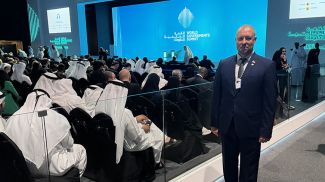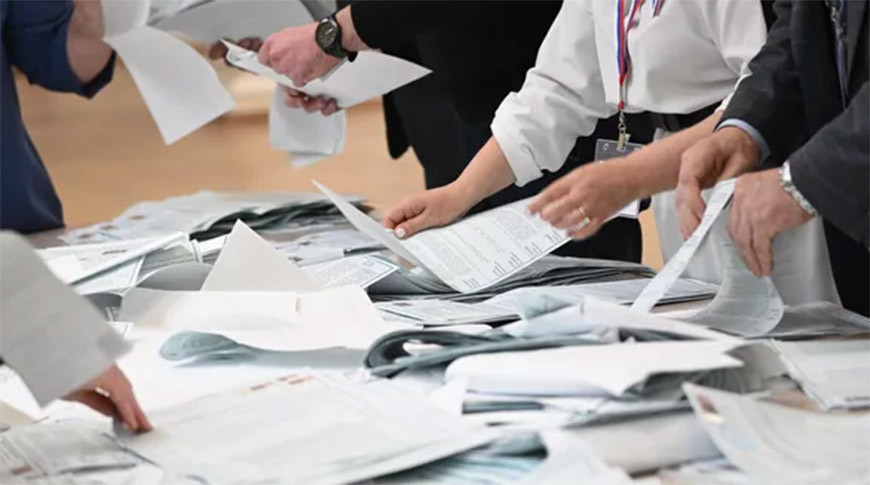
A record high result and a record high turnout… These are the results of the Russia president election. The counting of votes continues, but the winner is already clear. The incumbent president of Russia, Vladimir Putin, is gaining more than 87% of the vote. Voter turnout exceeded 74%, which was the highest in the history of modern Russia.
After the voting was over, Putin came to his campaign headquarters. The Russian leader gave an assessment of the election, outlined the priorities for the new term and Russia's further plans in connection with the military special operation in Ukraine.
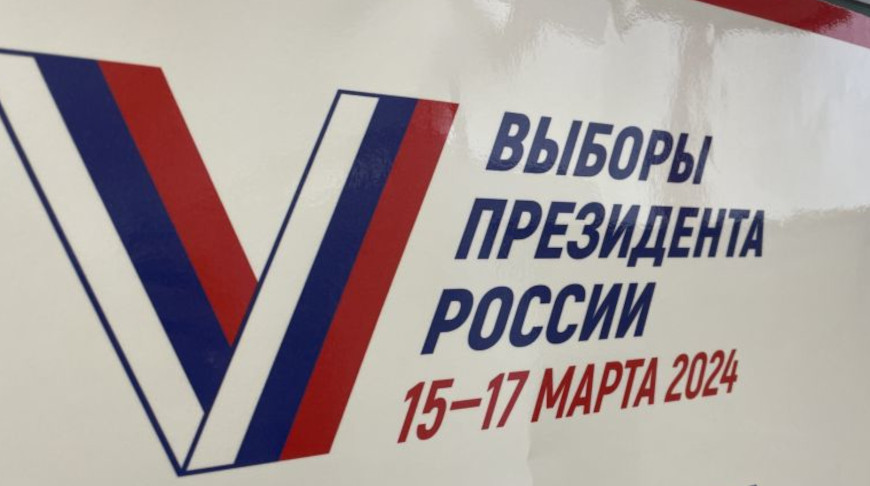
"Things turn our way." How was the election held?
For the first time the voting in the president election in Russia was extended to three days - from 15 to 17 March. The innovation turned out to be effective: by the end of the second day, according to the information board of the Central Election Commission, which shows the data received by the CEC in real time, the voter turnout approached the 60% mark.
The figure took into account only those who came to the polling station in person: residents of 29 regions had the opportunity to vote online for the first time in the presidential election. To do this, they had to submit an application on the Gosuslugi website until 11 March. According to the CEC, applications were received from 4.76 million Russians to participate in online voting. By the way, Russian President Vladimir Putin, Prime Minister Mikhail Mishustin, Deputy Prime Minister Dmitry Chernyshenko, Moscow Mayor Sergei Sobyanin, and the heads of some ministries preferred to cast their votes in this way.
Four candidates were running in the election: the incumbent head of state Vladimir Putin, who was running as an independent candidate, Deputy Speaker of the State Duma Vladislav Davankov nominated by the New People party, head of the LDPR party faction in the State Duma Leonid Slutsky and candidate from the Communist Party of the Russian Federation, State Duma member Nikolai Kharitonov.
In general, the election was held in an orderly manner and without serious incidents, except for individual provocations. For example, several polling stations had to deal with attempts to spoil ballot boxes with green dye and other liquids and to start fire. In all cases, law enforcement acted promptly and detained the offenders, who admitted that they acted either for money or were manipulated by phone scammers. In any case, those detained are facing real prison sentences for obstructing the election.
The attempts by Ukrainian saboteurs to break into the territory of Belgorod Oblast and Kursk Oblast were designed to disrupt the election. At a meeting of the Russian Security Council on 15 March, Vladimir Putin said that the enemy suffered heavy losses and fled, and expressed confidence that the Russians would respond to such acts with even greater unity.
A great turnout was recorded in the Donetsk People's Republic and Lugansk People's Republic, Zaporozhye Oblast and Kherson Oblast. The new regions held the early election. In Kherson Oblast, 58.14% of voters took advantage of this opportunity, in the DPR on the third day of early voting, the turnout was 36.91%. As part of the early voting, the right to vote was also exercised by military men participating in the special military operation.
Russians abroad voted actively too. However, there were some provocations as well. Thus, Latvia’s Minister of Justice Inese Lībiņa-Egnere said that the country's authorities consider voting in the Russian president election as support for the special military operation in Ukraine. She said that Russians who come to the embassy to cast their vote can be prosecuted. However, later the minister changed her mind. "Voting at the Russian embassy is not a violation of Latvian law in itself and does not entail any punishment," Inese Lībiņa-Egnere said. She noted that the Latvian authorities do not want to create an international scandal and intend to act as a democratic state.
Russian Ambassador to the United States Anatoly Antonov said that Russian diplomats will send a note to the U.S. authorities in connection with the actions of the secret service of the State Department near the Russian Embassy in Washington on the day of the vote. According to him, this service blocked the entrance to the Russian embassy and created obstacles for Russians who came to vote. In addition, there were people sporting Ukrainian symbols, and those insulting diplomats.
Evgeny Ivanov, Chairman of the Russian Foreign Ministry's commission on election, State Secretary and Deputy Minister of Foreign Affairs of the Russian Federation, said that anti-Russian forces abroad "made pathetic unscrupulous attempts to manipulate some facts and to misrepresent voters as protesters. "The technology was primitive: they used numerous photos and videos of Russians queuing to vote at the polls set up by Russian foreign missions at different times and on different days and edited their sequence to pass it as some kind of protest activity," TASS quoted the diplomat as saying. He stressed that citizens of the Russian Federation abroad came to vote in the presidential election, not to participate in mythical protests.
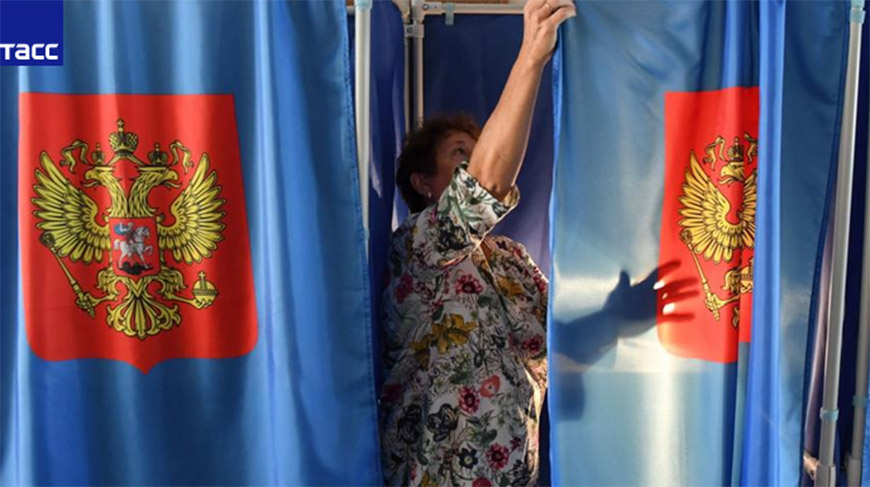
Russian Foreign Ministry spokeswoman Maria Zakharova, in response to Western attempts to interfere with the election, proposed the hashtag "Things turn out our way." "Here is a hashtag, a slogan. It can already be used as a meme, based on what the West planned for us and what happened as a result. They wanted things as worse as possible but they turned out our way," the diplomat said.
Due to the tense international situation, observers of the OSCE Office for Democratic Institutions and Human Rights, the Parliamentary Assembly of the Council of Europe and other similar structures did not participate in the observation of the Russian presidential election. The Russian Foreign Ministry justified the decision not to invite these missions by their political bias and inadequate requirements. At the same time, the international observation of the Russian president election still turned out to be impressive: according to the CEC, representatives of 106 countries were accredited s international observers.
Belarus sent a representative delegation of 43 observers. Among them were MPs, representatives of the CEC, diplomats. They worked both individually on the invitation of their colleagues from the Russian parliament, the Central Election Commission of Russia and other organizations, and as part of observation missions from the CIS, the CSTO Parliamentary Assembly and other international structures.
Belarusian observers visited polling stations in the city of Moscow and in the Russian regions, talked to members of precinct election commissions and other international and national observers, and held meetings at the election headquarters of the candidates. Thus, the head of the Belarusian Central Election Commission Igor Karpenko, sharing his impressions, said that the electoral process was well-organized: "People have the opportunity to freely express their will. There is someone to choose from, there is an opportunity to vote: online or in-person. The turnout is good, people are coming to the polls, there is interest, and I think that the election will be held in an orderly manner in accordance with the current legislation of the Russian Federation.”
"We see that the voting process complies with the legislation of the Russian Federation, and that all conditions have been created for the fair and open election," said Olga Petrashova, a member of the House of Representatives of the National Assembly of Belarus, the coordinator of the delegation of the Parliamentary Assembly of the Union State of Belarus and Russia as part of the CIS international observer mission. She expressed confidence that the work of observers from the CIS countries will help to objectively assess the election. "The findings that we will issue based on the results of our observation will become a reliable barrier against various kinds of fake information," Olga Petrashova is sure.
According to the Constitution of the Russian Federation, the president of the country is elected for six years. The first results of voting in the east of the country and exit poll data were announced immediately after the polls closed throughout Russia.
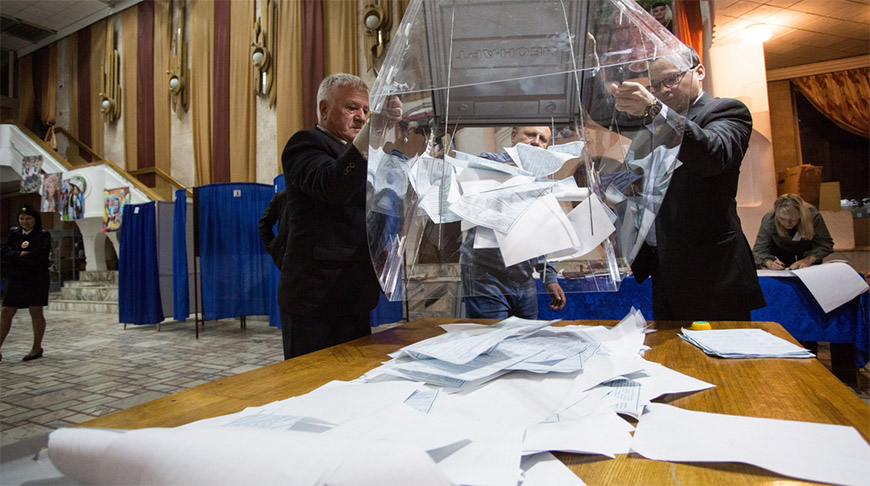
According to the CEC, as of 18.00 on 17 March, the turnout in the country was 74.22%.
The CEC promises to announce the first official results by noon on 18 March.
Leonid Slutsky noted that Putin won the Russian president election with a historic result. "He did, with a historic result," Slutsky said when asked by RIA Novosti whether Putin won the election.
Vladislav Davankov said that he was pleased to take second place in online voting. "It's nice, though it's not the place itself that is important, it's the people who supported us and will stay with us after this campaign," TASS quoted the politician as saying.
He also said that observers from the New People party did not detect any serious violations during the presidential election in the Russian Federation.
“Voters have shown true unity and consolidation to the international community,” Nikolai Kharitonov said. He hopes that the election campaign helped his team draw more attention to the party’s program.
“We have many challenges ahead.” What goals does Putin set?
Closer to midnight, Putin arrived at his campaign headquarters, thanked the campaign staff and emphasized that Russia must become even stronger and more effective. He also thanked all Russians who went to the polls and made a special mention of participants in the special military operation, TASS reports.
Answering questions from journalists, the president named tasks he was going to address after re-election. These tasks are associated with the special military operation and the country’s defense capability. He praised the effective work of the government, the presidential administration and the Bank of Russia. According to him, the Russian military are now pushing forward after being in active defense. He also commented on a number of issues, including French President Emmanuel Macron's proposal to observe a ceasefire in Ukraine during the Paris Olympics. The Russian head of state is confident that the high turnout is due to the situation around Russia. “It has to do with the current situation, with the fact that we are forced, in the literal sense of the word, to defend the interests of our citizens, our people, with weapon in our hands, and to lay a foundation for a full-fledged, sovereign, safe development of the Russian Federation, our Motherland,” said the Russian leader.
He emphasized that the Russian people are the source of power in the country, and the peoples of the Russian Federation had an opportunity to show their unity by casting their ballots. “Of course, we have many tasks ahead. I think that it has become clear to everyone that when we are consolidated, no one will be able to intimidate and suppress us, our will, consciousness. History knows many examples of this. Such attempts have failed now and will fail in the future. It’s not going to happen,” said the Russian president.
Answering questions from journalists after the meeting, Vladimir Putin said that during his new presidential term he would prioritize resolving tasks associated with the special operation in Ukraine, as well as strengthening the military.
“First of all, we need to address problems related to the special military operation, strengthen defense capabilities, reinforce the army. This is already happening - we all see it – and we are making good progress in this direction,” Vladimir Putin said.
He went on saying that he did not know about Macron’s ceasefire proposal. Commenting on this suggestion, he noted that the Russian Federation is ready to consider any proposals, but will proceed from its interests and the situation with the special military operation.
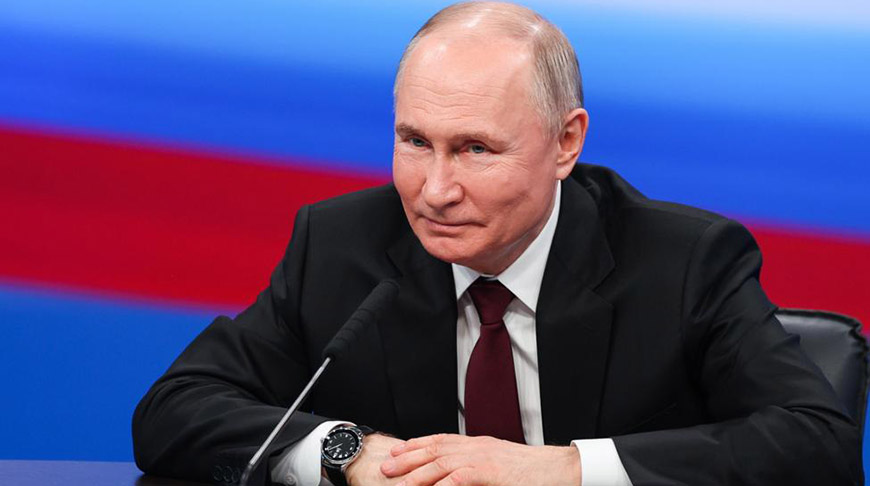
“You know, I keep saying it all the time, and I’ll repeat it, we are in favor of peace talks, but only if the other side is serious about it and wants it not because it is running out of ammunition, but because it wants to build peaceful, long-term good neighborly relations between the two states, and not use this pause as an opportunity for rearmament for 1.5-2 years,” Vladimir Putin said.
Answering a question about the attempts of the Russian Volunteer Corps to carry out sabotage operations in the border areas, Vladimir Putin compared this formation with the army of the traitor Andrei Vlasov during the Great Patriotic War. “There was such a formation - the Vlasovites - that was put together by the traitor Vlasov during the Great Patriotic War. They also fought against their Motherland. How they ended up is well known,” Vladimir Putin said.
Taking into account the attacks on Belgorod Oblast, Russia may be forced to create a certain buffer zone in the adjacent territories of Ukraine, which will be quite difficult to overcome. The size of this zone “is a matter of another discussion”.
The Russian leader also commented on incidents during the election, in particular about damaging ballots at polling stations. “This is bad. If you don’t want to vote, if you don’t like anyone, that’s one thing. But if you decide to wrong-foot those people who came to a polling station because it was important for them to vote, and you don’t care about their position, then that’s bad," the Russian president said.
Vladimir Putin remarked that the only thing he can praise opposition for is their call to go to polling stations at noon. “If the opposition thought that they needed to come and vote, it doesn’t matter for whom, but to show up and vote, that’s good, well done,” Vladimir Putin said. “As far as I understand, this didn’t produce any notable effect.”
Vladimir Putin also compared the election in the Russian Federation with that in the United States. According to him, the election in Russia is democratic, unlike the election in the United States, where they use administrative leverages, including courts, to attack one of the presidential candidates. “This is just a disaster, not democracy,” Vladimir Putin said.
In addition to that, mail-in voting creates opportunities for electoral fraud. “Who oversees it? Nobody. They bought a vote for $10, and then they bought thousands of votes, they came in and threw in a bunch of votes by midnight - that’s it, here is your voting, here is your democracy,” said the Russian president.
According to Vladimir Putin, the West's reaction to the presidential election in Russia is not surprising: “Did your really expect them to stand up and salute? They are fighting against us, and they are doing it with weapons."
Vladimir Putin also believes that a direct clash between Russia and NATO cannot be ruled out in the future, although no one is interested in this. “I think that everything is possible in today’s world. But this will be one step away from a full-scale third world war. I think that hardly anyone is interested in this,” Vladimir Putin said.
“West will have to reckon with an emboldened Russia .” What did Western media write about the election?
Western media were not surprised by Vladimir Putin's victory in Russia’s presidential election. Journalists paid attention to the high turnout and the landslide win of the incumbent president. There were also traditional accusations of “violations” during the voting. Nevertheless, a number of media outlets acknowledged that pre-election opinion polls showed huge public support for the country’s current policy.
BBC: “Putin is winning the election in landslide with record turnout - just like the Kremlin wanted... According to the Central Election Commission, people actively voted even in the regions bordering Ukraine, where shelling continued throughout all three days of voting. For example, according to Russian authorities, the turnout in Belgorod Oblast exceeded 83% by mid-Sunday.”
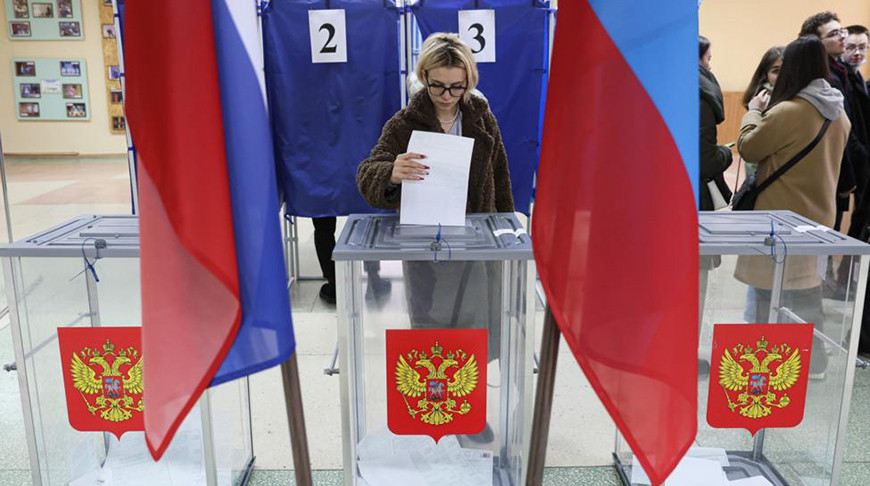
The Guardian: In a speech at his campaign headquarters on Sunday evening, Putin brushed off western criticism of the elections, telling his supporters it was “expected”. The war was front and center in his victory speech, as Putin claimed he was securing the border from recent raids by pro-Ukrainian military units and said that his main tasks as president would be the war in Ukraine, “strengthening defence capacity and the military”. Asked about the potential for a direct conflict with NATO, he said: “I think that everything is possible in the modern world … everyone understands that this would be one step from a full-scale third world war. I don’t think that anyone is interested in that.”
Reuters: "President Vladimir Putin won a record post-Soviet landslide in Russia’s elections on Sunday… The victory, he said, showed Moscow had been right to stand up to the West and send its troops into Ukraine. Putin, a former KGB lieutenant colonel who first rose to power in 1999, made it clear that the result should send a message to the West that its leaders will have to reckon with an emboldened Russia, whether in war or in peace, for many more years to come.”
CNN: Preliminary election results in Russia suggest a predictably big victory for the Kremlin leader. With half of ballots counted, Putin was leading with 87.3% of the votes, according to the figures released by Russia's Central Election Commission on Sunday. This means that Putin will rule the country until at least 2030... Measuring public opinion is difficult in countries like Russia. But the Levada Center, a non-governmental polling organization, reports that nearly half of Russians strongly support the conflict in Ukraine, and more than three-quarters support it to some extent. Levada also reports that Putin's approval rating exceeds 80%, a figure nearly unattainable for Western politicians; this is a significant increase from three years prior to the conflict in Ukraine.”
Euronews: “Opinion polls suggest that the majority of Russians support the course pursued by the country and its leader Vladimir Putin. People in the age group between 25 and 34 tend to disagree with the authorities the most.”
The New York Times: “Despite the absence of a genuine political opposition and a plethora of challenges facing the country, many Russians went to the polls on Sunday to show their support for President Vladimir Putin... Some voters credited Putin for a period of relative economic prosperity after a difficult transition from communism in the 1990s. And they ignored the consequences of the war in Ukraine and the Western sanctions.”
After the voting was over, Putin came to his campaign headquarters. The Russian leader gave an assessment of the election, outlined the priorities for the new term and Russia's further plans in connection with the military special operation in Ukraine.

"Things turn our way." How was the election held?
For the first time the voting in the president election in Russia was extended to three days - from 15 to 17 March. The innovation turned out to be effective: by the end of the second day, according to the information board of the Central Election Commission, which shows the data received by the CEC in real time, the voter turnout approached the 60% mark.
The figure took into account only those who came to the polling station in person: residents of 29 regions had the opportunity to vote online for the first time in the presidential election. To do this, they had to submit an application on the Gosuslugi website until 11 March. According to the CEC, applications were received from 4.76 million Russians to participate in online voting. By the way, Russian President Vladimir Putin, Prime Minister Mikhail Mishustin, Deputy Prime Minister Dmitry Chernyshenko, Moscow Mayor Sergei Sobyanin, and the heads of some ministries preferred to cast their votes in this way.
Four candidates were running in the election: the incumbent head of state Vladimir Putin, who was running as an independent candidate, Deputy Speaker of the State Duma Vladislav Davankov nominated by the New People party, head of the LDPR party faction in the State Duma Leonid Slutsky and candidate from the Communist Party of the Russian Federation, State Duma member Nikolai Kharitonov.
In general, the election was held in an orderly manner and without serious incidents, except for individual provocations. For example, several polling stations had to deal with attempts to spoil ballot boxes with green dye and other liquids and to start fire. In all cases, law enforcement acted promptly and detained the offenders, who admitted that they acted either for money or were manipulated by phone scammers. In any case, those detained are facing real prison sentences for obstructing the election.
The attempts by Ukrainian saboteurs to break into the territory of Belgorod Oblast and Kursk Oblast were designed to disrupt the election. At a meeting of the Russian Security Council on 15 March, Vladimir Putin said that the enemy suffered heavy losses and fled, and expressed confidence that the Russians would respond to such acts with even greater unity.
A great turnout was recorded in the Donetsk People's Republic and Lugansk People's Republic, Zaporozhye Oblast and Kherson Oblast. The new regions held the early election. In Kherson Oblast, 58.14% of voters took advantage of this opportunity, in the DPR on the third day of early voting, the turnout was 36.91%. As part of the early voting, the right to vote was also exercised by military men participating in the special military operation.
Russians abroad voted actively too. However, there were some provocations as well. Thus, Latvia’s Minister of Justice Inese Lībiņa-Egnere said that the country's authorities consider voting in the Russian president election as support for the special military operation in Ukraine. She said that Russians who come to the embassy to cast their vote can be prosecuted. However, later the minister changed her mind. "Voting at the Russian embassy is not a violation of Latvian law in itself and does not entail any punishment," Inese Lībiņa-Egnere said. She noted that the Latvian authorities do not want to create an international scandal and intend to act as a democratic state.
Russian Ambassador to the United States Anatoly Antonov said that Russian diplomats will send a note to the U.S. authorities in connection with the actions of the secret service of the State Department near the Russian Embassy in Washington on the day of the vote. According to him, this service blocked the entrance to the Russian embassy and created obstacles for Russians who came to vote. In addition, there were people sporting Ukrainian symbols, and those insulting diplomats.
Evgeny Ivanov, Chairman of the Russian Foreign Ministry's commission on election, State Secretary and Deputy Minister of Foreign Affairs of the Russian Federation, said that anti-Russian forces abroad "made pathetic unscrupulous attempts to manipulate some facts and to misrepresent voters as protesters. "The technology was primitive: they used numerous photos and videos of Russians queuing to vote at the polls set up by Russian foreign missions at different times and on different days and edited their sequence to pass it as some kind of protest activity," TASS quoted the diplomat as saying. He stressed that citizens of the Russian Federation abroad came to vote in the presidential election, not to participate in mythical protests.

Russian Foreign Ministry spokeswoman Maria Zakharova, in response to Western attempts to interfere with the election, proposed the hashtag "Things turn out our way." "Here is a hashtag, a slogan. It can already be used as a meme, based on what the West planned for us and what happened as a result. They wanted things as worse as possible but they turned out our way," the diplomat said.
Due to the tense international situation, observers of the OSCE Office for Democratic Institutions and Human Rights, the Parliamentary Assembly of the Council of Europe and other similar structures did not participate in the observation of the Russian presidential election. The Russian Foreign Ministry justified the decision not to invite these missions by their political bias and inadequate requirements. At the same time, the international observation of the Russian president election still turned out to be impressive: according to the CEC, representatives of 106 countries were accredited s international observers.
Belarus sent a representative delegation of 43 observers. Among them were MPs, representatives of the CEC, diplomats. They worked both individually on the invitation of their colleagues from the Russian parliament, the Central Election Commission of Russia and other organizations, and as part of observation missions from the CIS, the CSTO Parliamentary Assembly and other international structures.
Belarusian observers visited polling stations in the city of Moscow and in the Russian regions, talked to members of precinct election commissions and other international and national observers, and held meetings at the election headquarters of the candidates. Thus, the head of the Belarusian Central Election Commission Igor Karpenko, sharing his impressions, said that the electoral process was well-organized: "People have the opportunity to freely express their will. There is someone to choose from, there is an opportunity to vote: online or in-person. The turnout is good, people are coming to the polls, there is interest, and I think that the election will be held in an orderly manner in accordance with the current legislation of the Russian Federation.”
"We see that the voting process complies with the legislation of the Russian Federation, and that all conditions have been created for the fair and open election," said Olga Petrashova, a member of the House of Representatives of the National Assembly of Belarus, the coordinator of the delegation of the Parliamentary Assembly of the Union State of Belarus and Russia as part of the CIS international observer mission. She expressed confidence that the work of observers from the CIS countries will help to objectively assess the election. "The findings that we will issue based on the results of our observation will become a reliable barrier against various kinds of fake information," Olga Petrashova is sure.
According to the Constitution of the Russian Federation, the president of the country is elected for six years. The first results of voting in the east of the country and exit poll data were announced immediately after the polls closed throughout Russia.

‘A historic result’. What do the preliminary results show?
According to the CEC, after processing 99.71% of the protocols, the incumbent head of state, Vladimir Putin, is in the lead. He gains 87.31%.
ikolai Kharitonov from the Communist Party of the Russian Federation goes second with 4.3% of the vote. They are followed by Vladislav Davankov from the New People party with 3.83% and Leonid Slutsky from the Liberal Democratic Party with 3.21%.
ikolai Kharitonov from the Communist Party of the Russian Federation goes second with 4.3% of the vote. They are followed by Vladislav Davankov from the New People party with 3.83% and Leonid Slutsky from the Liberal Democratic Party with 3.21%.
According to the CEC, as of 18.00 on 17 March, the turnout in the country was 74.22%.
The CEC promises to announce the first official results by noon on 18 March.
Leonid Slutsky noted that Putin won the Russian president election with a historic result. "He did, with a historic result," Slutsky said when asked by RIA Novosti whether Putin won the election.
Vladislav Davankov said that he was pleased to take second place in online voting. "It's nice, though it's not the place itself that is important, it's the people who supported us and will stay with us after this campaign," TASS quoted the politician as saying.
He also said that observers from the New People party did not detect any serious violations during the presidential election in the Russian Federation.
“Voters have shown true unity and consolidation to the international community,” Nikolai Kharitonov said. He hopes that the election campaign helped his team draw more attention to the party’s program.
“We have many challenges ahead.” What goals does Putin set?
Closer to midnight, Putin arrived at his campaign headquarters, thanked the campaign staff and emphasized that Russia must become even stronger and more effective. He also thanked all Russians who went to the polls and made a special mention of participants in the special military operation, TASS reports.
Answering questions from journalists, the president named tasks he was going to address after re-election. These tasks are associated with the special military operation and the country’s defense capability. He praised the effective work of the government, the presidential administration and the Bank of Russia. According to him, the Russian military are now pushing forward after being in active defense. He also commented on a number of issues, including French President Emmanuel Macron's proposal to observe a ceasefire in Ukraine during the Paris Olympics. The Russian head of state is confident that the high turnout is due to the situation around Russia. “It has to do with the current situation, with the fact that we are forced, in the literal sense of the word, to defend the interests of our citizens, our people, with weapon in our hands, and to lay a foundation for a full-fledged, sovereign, safe development of the Russian Federation, our Motherland,” said the Russian leader.
He emphasized that the Russian people are the source of power in the country, and the peoples of the Russian Federation had an opportunity to show their unity by casting their ballots. “Of course, we have many tasks ahead. I think that it has become clear to everyone that when we are consolidated, no one will be able to intimidate and suppress us, our will, consciousness. History knows many examples of this. Such attempts have failed now and will fail in the future. It’s not going to happen,” said the Russian president.
Answering questions from journalists after the meeting, Vladimir Putin said that during his new presidential term he would prioritize resolving tasks associated with the special operation in Ukraine, as well as strengthening the military.
“First of all, we need to address problems related to the special military operation, strengthen defense capabilities, reinforce the army. This is already happening - we all see it – and we are making good progress in this direction,” Vladimir Putin said.
He went on saying that he did not know about Macron’s ceasefire proposal. Commenting on this suggestion, he noted that the Russian Federation is ready to consider any proposals, but will proceed from its interests and the situation with the special military operation.

“You know, I keep saying it all the time, and I’ll repeat it, we are in favor of peace talks, but only if the other side is serious about it and wants it not because it is running out of ammunition, but because it wants to build peaceful, long-term good neighborly relations between the two states, and not use this pause as an opportunity for rearmament for 1.5-2 years,” Vladimir Putin said.
Answering a question about the attempts of the Russian Volunteer Corps to carry out sabotage operations in the border areas, Vladimir Putin compared this formation with the army of the traitor Andrei Vlasov during the Great Patriotic War. “There was such a formation - the Vlasovites - that was put together by the traitor Vlasov during the Great Patriotic War. They also fought against their Motherland. How they ended up is well known,” Vladimir Putin said.
Taking into account the attacks on Belgorod Oblast, Russia may be forced to create a certain buffer zone in the adjacent territories of Ukraine, which will be quite difficult to overcome. The size of this zone “is a matter of another discussion”.
The Russian leader also commented on incidents during the election, in particular about damaging ballots at polling stations. “This is bad. If you don’t want to vote, if you don’t like anyone, that’s one thing. But if you decide to wrong-foot those people who came to a polling station because it was important for them to vote, and you don’t care about their position, then that’s bad," the Russian president said.
Vladimir Putin remarked that the only thing he can praise opposition for is their call to go to polling stations at noon. “If the opposition thought that they needed to come and vote, it doesn’t matter for whom, but to show up and vote, that’s good, well done,” Vladimir Putin said. “As far as I understand, this didn’t produce any notable effect.”
Vladimir Putin also compared the election in the Russian Federation with that in the United States. According to him, the election in Russia is democratic, unlike the election in the United States, where they use administrative leverages, including courts, to attack one of the presidential candidates. “This is just a disaster, not democracy,” Vladimir Putin said.
In addition to that, mail-in voting creates opportunities for electoral fraud. “Who oversees it? Nobody. They bought a vote for $10, and then they bought thousands of votes, they came in and threw in a bunch of votes by midnight - that’s it, here is your voting, here is your democracy,” said the Russian president.
According to Vladimir Putin, the West's reaction to the presidential election in Russia is not surprising: “Did your really expect them to stand up and salute? They are fighting against us, and they are doing it with weapons."
Vladimir Putin also believes that a direct clash between Russia and NATO cannot be ruled out in the future, although no one is interested in this. “I think that everything is possible in today’s world. But this will be one step away from a full-scale third world war. I think that hardly anyone is interested in this,” Vladimir Putin said.
“West will have to reckon with an emboldened Russia .” What did Western media write about the election?
Western media were not surprised by Vladimir Putin's victory in Russia’s presidential election. Journalists paid attention to the high turnout and the landslide win of the incumbent president. There were also traditional accusations of “violations” during the voting. Nevertheless, a number of media outlets acknowledged that pre-election opinion polls showed huge public support for the country’s current policy.
BBC: “Putin is winning the election in landslide with record turnout - just like the Kremlin wanted... According to the Central Election Commission, people actively voted even in the regions bordering Ukraine, where shelling continued throughout all three days of voting. For example, according to Russian authorities, the turnout in Belgorod Oblast exceeded 83% by mid-Sunday.”

The Guardian: In a speech at his campaign headquarters on Sunday evening, Putin brushed off western criticism of the elections, telling his supporters it was “expected”. The war was front and center in his victory speech, as Putin claimed he was securing the border from recent raids by pro-Ukrainian military units and said that his main tasks as president would be the war in Ukraine, “strengthening defence capacity and the military”. Asked about the potential for a direct conflict with NATO, he said: “I think that everything is possible in the modern world … everyone understands that this would be one step from a full-scale third world war. I don’t think that anyone is interested in that.”
Reuters: "President Vladimir Putin won a record post-Soviet landslide in Russia’s elections on Sunday… The victory, he said, showed Moscow had been right to stand up to the West and send its troops into Ukraine. Putin, a former KGB lieutenant colonel who first rose to power in 1999, made it clear that the result should send a message to the West that its leaders will have to reckon with an emboldened Russia, whether in war or in peace, for many more years to come.”
CNN: Preliminary election results in Russia suggest a predictably big victory for the Kremlin leader. With half of ballots counted, Putin was leading with 87.3% of the votes, according to the figures released by Russia's Central Election Commission on Sunday. This means that Putin will rule the country until at least 2030... Measuring public opinion is difficult in countries like Russia. But the Levada Center, a non-governmental polling organization, reports that nearly half of Russians strongly support the conflict in Ukraine, and more than three-quarters support it to some extent. Levada also reports that Putin's approval rating exceeds 80%, a figure nearly unattainable for Western politicians; this is a significant increase from three years prior to the conflict in Ukraine.”
Euronews: “Opinion polls suggest that the majority of Russians support the course pursued by the country and its leader Vladimir Putin. People in the age group between 25 and 34 tend to disagree with the authorities the most.”
The New York Times: “Despite the absence of a genuine political opposition and a plethora of challenges facing the country, many Russians went to the polls on Sunday to show their support for President Vladimir Putin... Some voters credited Putin for a period of relative economic prosperity after a difficult transition from communism in the 1990s. And they ignored the consequences of the war in Ukraine and the Western sanctions.”








